Listen to The Saturday Stoke
Thoreau said, “All good things are wild and free.” His now-famous statement comes at the end of a rather lengthy but well-wrought and important essay on the value of “Nature,” walking, and wildness.
In the essay, Thoreau notices how all great founders of nations and empires did so after being weened on wilderness. Romulus and Remus, the mythical founders of Rome, for example, were suckled and reared by a wolf. And ironically that great empire fell at the hands of other children of the wolf—the northern barbarians. Why did Rome fall? Because the children of the wolf-brothers became fat and sophisticated and soft—they traded their wolf-ness for the tameness of “proper” society.
I wonder too if we, as Christians and the Church, haven’t lost our own wolf-ness. And by wolf-ness I mean our innate wildness. Think for a moment about how we view the wilderness in today’s world of luxury. We understand wilderness in this way: the wilderness we see and experience is rugged yet beautiful; remote yet accessible; dangerous yet Instagram-worthy. We can visit the wilderness when we want to, keeping it at arm’s length. Wilderness in today’s world has almost become a commodity; something we control, something used for branding, something we consume rather than experience in deep ways that speak to and minister to our spirits.
But the idea of wilderness takes different forms and expresses varied meanings. We need only turn to the Scriptures to find another kind of wilderness.
In the Bible, wilderness can take on negative hues; it’s a place of evil, it is uninhabitable, fraught with danger and demons, a place of chaos, a place devoid of beauty.
But wilderness in the Bible is also, paradoxically, a place of refuge, deliverance and preparation.
I think of Jesus, who often retreated to the wilderness to seek the will of his Father. I recall how, after he shouted into death and brought Lazarus back to life, he retreated to the wilderness area with his disciples and stayed away from the Jews until he was ready to return to Jerusalem to meet his fate.
Have you ever thought about what Jesus was doing during those days before he returned to Bethany? Did he struggle in the nights with fervent prayer, knowing the path that lay before him? Did he try to spend just a few more carefree evenings by the fire with his brothers, talking about his “kingdom” and the place his father was preparing?
Did he walk into the wilderness where angels met him to minister to him? Did he and John, the disciple he loved, peel off from the group for a heart to heart talk—the kind intimate friends have before one of them must endure something hard, like a surgery, or months away from family, or going off to war?
Perhaps for Jesus, wilderness represented that place of utter dependence upon his Father. There, he found spiritual sustenance even in a place of desolation. Remember, it was Elijah who wandered off into the wilderness and made an eight day journey into a pilgrimage of forty days and forty nights, all the while completely reliant upon food from heaven. It was the angel of the Lord who fed him this food, sustaining him.
There, he remained, abiding in the awe of heaven. Remember it was Moses who met God on Mt. Sinai, not once but twice, both times for forty days and forty nights. And in that time, he abided in the cloud of God’s glory and radiance. And remember, it was this radiance that he took with him, back to the Israelites. They feared the radiance, didn’t understand it. But it gave Moses life itself and changed him.
In the epoch of COVID-19, with long stretches of wilderness-feeling time now experienced, with more on the horizon, what can we learn from the biblical image of wilderness? How can we join this view with our Enlightenment-infused perspective of wilderness as a commodity?
The Christian Church has a long history with wilderness. Our forebears wandered there, our Savior was tempted but also refreshed there, and God appeared to his prophets there.
Due to COVID-19, we find ourselves in a time of wilderness. And so many of us are not comfortable. We feel unsettled in the isolation. We thirst for the normalcy of speed and pace and bustle. We feed ourselves by bingeing the nights away. We gorge ourselves on whatever is simple and easy. Why?
Because we’ve lost the ability to rest and retreat. We’ve lost the grit needed to spend days in isolation from society. We’re not content with a walk in the woods. We’ve not trained ourselves in the childlike art of marvelling at the simple wonders of the world—like the full moon in the late evening, or Venus striding the western heavens, or the noble blue bird dipping and diving up and over branches to her little ones.
John Muir, the famous naturalist philosopher said, “The mountains are fountains of men as well as of rivers, of glaciers, of fertile soil. The great poets, philosophers, prophets, able men whose thoughts and deeds have moved the world, have come down from the mountains – mountain dwellers who have grown strong there with the forest trees in Nature’s workshops.”
We should seek out the workshop of the wilderness, and learn and grow.
But sometimes the metaphorical wilderness finds us in this life at inopportune times. Instead, they come unexpectedly. Other times, we’re driven into them. But no matter how we find ourselves caught in the wilderness, we must learn to embrace it, to learn from it, and to allow God to teach us the hard things of faith like: the giving up of self, the letting go of material things, the thirst for holy fire, the simple rugged beauty of a starry night, the time of days passing with us, not in control of anything.
Friends, the journey before us calls for a new mindset.
One not beset with all that we can’t do. But one with eyes to the horizon.
This journey calls for the wild woman, the wild man, to take up dreams and see them through. To run with the horses across the plains in untamed holy ambition. We need to forge new paths. Wild paths that demand a strength not of our own. Paths that require our reliance upon a wild God, an untamed God, a good God.
Feed your soul today with the light of life, like Moses did as he stood in the awful wonderful presence of God. And give your dreams their due diligence. For we may stay low for some time, but remember, we rise on eagle’s wings, for ours is the wild beyond.
Stay stoked my friends.

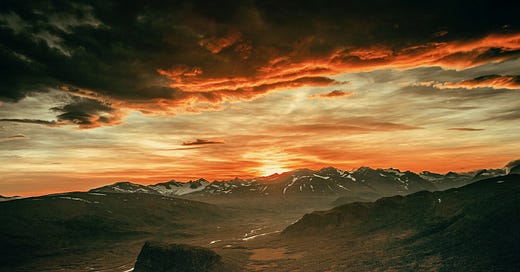





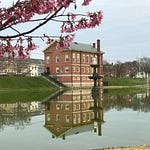

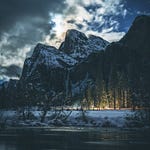
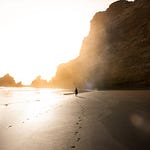


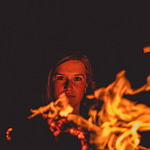
Share this post